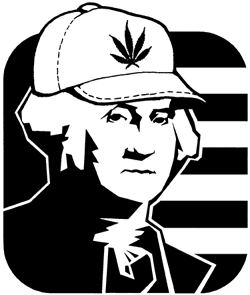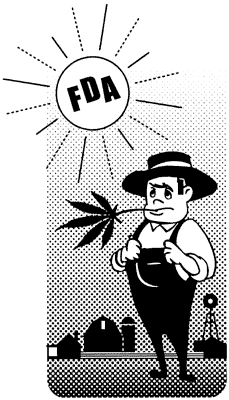

The DEA's
Hemp Hatred

E-Mail Us
Your Comments
|
Hemp Is Good Food
But the DEA Can't Stomach It
by David Bronner
art/Tom Hope
 On January 7th, the Hemp Industries Association and several major hemp food companies in the U.S. and Canada filed their opening brief urging the 9th Circuit Court of Appeals to throw out the U.S. Drug Enforcement Administration's (DEA's) "interpretive" rule, which purports to ban the sale of nutritious hemp foods containing harmless trace amounts of naturally-occurring tetrahydrocannabinol (THC), the active ingredient in marijuana.
On January 14, Kenex Ltd., a Canadian agro-firm that has been growing and processing hemp oil, seed and fiber products in Canada for distribution throughout the United States for the past five years, filed a notice of intent to sue the U.S. government for $20 million under the North American Free Trade Agreement (NAFTA). They filed the suit because they feel the DEA's rule prevents Kenex from accessing American markets for its hemp food products, on which the firm depends for over three-quarters of its business.
On January 7th, the Hemp Industries Association and several major hemp food companies in the U.S. and Canada filed their opening brief urging the 9th Circuit Court of Appeals to throw out the U.S. Drug Enforcement Administration's (DEA's) "interpretive" rule, which purports to ban the sale of nutritious hemp foods containing harmless trace amounts of naturally-occurring tetrahydrocannabinol (THC), the active ingredient in marijuana.
On January 14, Kenex Ltd., a Canadian agro-firm that has been growing and processing hemp oil, seed and fiber products in Canada for distribution throughout the United States for the past five years, filed a notice of intent to sue the U.S. government for $20 million under the North American Free Trade Agreement (NAFTA). They filed the suit because they feel the DEA's rule prevents Kenex from accessing American markets for its hemp food products, on which the firm depends for over three-quarters of its business.
It all began on October 9, 2001 when, without public notice or opportunity for comment, the DEA issued an interpretive rule purporting to make hemp foods containing any traces of naturally occurring THC immediately illegal under the Controlled Substances Act (CSA) of 1970. Because trace THC contained in hemp seeds and oil does not pose any potential for abuse as a drug, the U.S. Congress exempted non-viable hemp seed and oil from control under the CSA. Similarly, Congress exempted poppy seeds from the CSA, although they contain trace opiates otherwise subject to control.
Sterilized hemp seeds have been available in the U.S. for decades and are recognized as an exceptional source of protein, vitamin E, and omega-3 and omega-6 essential fatty acids (EFAs - the "good fats" doctors recommend for good health). The superior nutritional profile of Hemp seed and oil makes it ideal as an essential fatty acid supplement and for a wide range of functional food applications. Hemp is increasingly incorporated into such foods as corn chips, nutrition bars, hummus, nondairy milks, breads and cereals. The high and balanced essential fatty acid content of hemp oil also makes it ideal as a topical ingredient in both leave-on and rinse-off bodycare products: the EFA's help soothe and restore skin in lotions and creams and give excellent emolliency and smooth feel to lotions, lip balms, conditioners, shampoos, soaps and shaving products. Estimated retail sales for hemp food and bodycare products in the U.S. exceeded $25 million in 2000, up from virtually nothing in the mid-90's. Hemp foods and bodycare products have penetrated the mainstream marketplace and rapid growth will hopefully continue despite the DEA's recent actions.
The hemp industry is reassuring retailers and consumers that hemp food products should remain on the shelves, as virtually all hemp foods do not contain detectable THC, according to the official Health Canada detection protocol. Independent studies and reviews conducted in the U.S. and by foreign governments have confirmed that trace THC found in the increasingly popular hemp foods cannot cause psychoactivity or any other health effects, nor result in a confirmed positive urine test for marijuana, even when unrealistically high amounts of hemp seed and oil are consumed daily. Hemp seeds and oil are as likely to be abused as poppy seed bagels for their trace opiate content, or fruit juices because of their trace alcohol content. Yet, the DEA has not tried to ban poppy seed bagels despite their trace opiates that have interfered with confirmation workplace drug testing, which hemp foods do not.
The hemp industry established the TestPledge program, in which TestPledge companies clean their hemp seed and oil to meet science based standards to assure consumers a wide margin of safety from confirming positive in a workplace drug-test. The validity of the TestPledge program was confirmed in the November/ December issue of the Journal of Analytical Toxicology by a study co-authored by Dr. Mahmoud ElSohly (along with Gero Leson, Petra Pless, Franjo Grotenhermen and Harold Kalant), who conducts marijuana research at the University of Mississippi and works closely with the DEA.
The DEA's rules are a blow to the efforts of environmentalists, farmers, and state lawmakers who have spent years to research, develop and commercialize hemp food and fiber products and create markets for such products. According to the Union of Concerned Scientists, the majority of ongoing ecological harm is caused by human activities in the areas of automobile production and transportation, meat and poultry production, agriculture, and home construction and maintenance. Environmentalists encourage incorporation of industrial hemp as a non-toxic, natural, raw material into the design and manufacturing process for these industries, which substantially reduces the ecological harm caused by these industries. Therefore, activities that promote industrial hemp and its markets, including food markets, also promote ecological benefits and environmental sustainability. Already, major automobile manufacturers such as BMW, Chrysler and Ford are increasingly using hemp fiber based bio-composites in interior body paneling.
 Unlike the U.S., other Western countries (Canada, Germany, England, France, Switzerland, Australia) have adopted rational THC limits for foods, similar to those voluntarily observed by North American hemp food companies, and no other Western nation has attempted to ban the consumption of hemp foods. The U.S. is also the only major industrialized nation to prohibit the growing and processing of hemp. The DEA failed to perform a risk assessment or offer any other policy rationale in their rulemaking. The FDA, not the DEA, is the appropriate U.S. government agency that should be involved in any regulation of hemp seed and oil. Canada is a NAFTA and WTO trading partner. The Canadian government has established and is currently reviewing hemp food regulations that do and will fully protect public health and safety in both Canada and America, and should be harmonized in the U.S. as soon as possible by the FDA. Poppy seeds contain trace opiates, fruit juice contains trace alcohol, hemp seeds contain trace THC: trace contaminants exist in nature and in our food supply, and our government regulatory agencies set non-zero limits to protect consumer health without unnecessarily burdening legitimate industry. Unlike the U.S., other Western countries (Canada, Germany, England, France, Switzerland, Australia) have adopted rational THC limits for foods, similar to those voluntarily observed by North American hemp food companies, and no other Western nation has attempted to ban the consumption of hemp foods. The U.S. is also the only major industrialized nation to prohibit the growing and processing of hemp. The DEA failed to perform a risk assessment or offer any other policy rationale in their rulemaking. The FDA, not the DEA, is the appropriate U.S. government agency that should be involved in any regulation of hemp seed and oil. Canada is a NAFTA and WTO trading partner. The Canadian government has established and is currently reviewing hemp food regulations that do and will fully protect public health and safety in both Canada and America, and should be harmonized in the U.S. as soon as possible by the FDA. Poppy seeds contain trace opiates, fruit juice contains trace alcohol, hemp seeds contain trace THC: trace contaminants exist in nature and in our food supply, and our government regulatory agencies set non-zero limits to protect consumer health without unnecessarily burdening legitimate industry.
The hemp industry's comments submitted to the DEA (PDF file) can be read online. Letters of opposition were sent to the DEA from the Canadian government, Congressman George Miller (D) CA, Congressman Barney Frank (D) MA and Hawaii State Rep. Cynthia Thielen and California State Rep. Virginia Strom-Martin sent in great letters as well. Thousands of other comments were submitted to the DEA from concerned citizens around the country. Vote Hemp is continuing to build Congressional support for hemp and recently organized the "DEA Taste Test" in which hemp activists passed out hemp foods to DEA employees and other federal agents and media at 76 government offices around the country, generating extensive local network television coverage. People are waking up to the benefits of hemp foods and industrial hemp in general, as well as the arbitrary, over-reactive and unreasonable nature of the DEA and the excesses of our government's war on drugs.
Concerned citizens can visit VoteHemp for detailed studies and reports on industrial hemp's benefits, and can sign up to receive Action Alerts regarding the latest news and actions in the hemp industry's battle with the DEA. A pre-written point and click letter is available at the website for people to send to their federal representatives, informing them of hemp's enormous potential and the DEA's attempts to sabotage its full integration into the American economy. Donations can be made by credit card at the website to support Vote Hemp's advocacy and defense of industrial hemp.•
David Bronner is President of Dr. Bronner's Magic Soaps (which uses hemp oil for its emollient smootheness), serves on the board of Vote Hemp and chairs the Hemp Industries Association (HIA) Food and Oil Committee.
Email your feedback on this article to editor@impactpress.com.
Make an IMPACT
|




